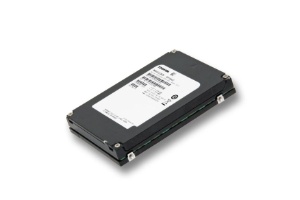Dec 15 2010
Extending its position in the enterprise storage market, Toshiba Storage Device Division announces its new family of enterprise-class solid state drives (SSDs).
Developed to meet the market’s demand for higher performance and lower power consumption, the new MKx001GRZB series combines Toshiba hard disk drive (HDD) expertise and its leadership as the inventor of NAND flash technology. The 2.5-inch small form factor drives use the latest 32 nanometer (nm) enterprise grade single-level cell (eSLC) NAND flash memory from Toshiba and 6Gb/sec Serial Attached SCSI (SAS) interface. Samples will be available for customer qualification in the first quarter of 2011 and volume production will begin in the first half of 2011.
 The new MKx001GRZB series SSDs use the latest 32 nanometer (nm) enterprise grade single-level cell (eSLC) NAND flash memory from Toshiba and 6Gb/sec Serial Attached SCSI (SAS) interface.
The new MKx001GRZB series SSDs use the latest 32 nanometer (nm) enterprise grade single-level cell (eSLC) NAND flash memory from Toshiba and 6Gb/sec Serial Attached SCSI (SAS) interface.
“Toshiba offers the industry’s most comprehensive range of storage technologies and the resulting synergies distinguish us as a world-class total storage provider,” said Joel Hagberg, vice president of enterprise marketing at Toshiba Storage Device Division. “Toshiba stands alone in the market as the only SSD supplier that is vertically integrated for NAND flash and has deep enterprise HDD expertise. We possess one of the world’s largest and most advanced NAND flash fabs, our own controller and firmware design teams, critical interface technologies, and established relationships with every major enterprise server and storage OEM. As a result, Toshiba is uniquely positioned to engineer solid state drives that deliver the performance, endurance, and reliability required for business critical applications.”
Available in capacities of 100GB1, 200GB1, and 400GB1, the MKx001GRZB family of SSD drives is designed for ease of integration into new or existing tier-0 enterprise storage systems and designs, including servers, direct-attached storage, and network-attached storage. The drives deliver performance that outpaces competing enterprise-class SSDs, with random sustained 90,000 read and 17,000 write IOPS2 and sequential sustained 510MB/sec read and 230MB/sec write throughput. Combined with a low power requirement of only 6.5 Watts at operation, the Toshiba SSD family also delivers an industry-leading power efficiency rating of 13,800 IOPS/Watt.
“The performance and energy benefits of SSDs can outweigh the cost difference compared to HDDs, and many organizations will want to use solid state technology for applications that require extremely fast data access,” said Joseph Unsworth, research director, Gartner. “However, the total share of the enterprise market that uses SSDs will remain relatively small until at least 2013. Storage suppliers who stand to gain the most from this technology shift will be those who can offer customers a unified product line that includes both SSD and HDD technologies combined with support and services capability.”
The Toshiba enterprise SSD lineup forms the pinnacle of a tiered storage architecture that enables organizations to effectively tune the performance, capacity, endurance, and reliability of their storage environments. For data storage that requires high reliability and high capacity – but not the very rapid access to data provided by SSDs – Toshiba has also released the new MKx001TRKB and MKx002TSKB series HDDs. The cost-effective nearline models feature a top storage capacity of 2TB1 in a traditional 3.5-inch form factor and leading-edge 6Gb/sec SAS3 and 3Gb/sec Serial ATA (SATA)4 interfaces. Intended for 24 x 7 operation, the MKx001TRKB and MKx002TSKB series drives also include features that are critical to business operations such as Error Correction (ECC), Rotational Vibration (RV) compensation technology for multi-drive systems, and enhanced power condition state technology.
Source: http://www.escardio.org/